In ancient times, before the dawn of men and women, the world was blanketed in a boundless silence, waiting for creation. The Mayan gods, powerful and wise, gathered in the celestial realms to craft the earth, its creatures, and beings who could honor and worship them. Thus begins the epic tale of the Popol Vuh—a tale of creation, destruction, and renewal. This sacred text chronicles the journeys of heroes, the wrath of gods, and the resilience of life. In the vast, timeless void, the gods—Heart of Sky, Tepeu, and Gucumatz—assembled to bring life into the world. First, they whispered the names of mountains, valleys, rivers, and forests, calling them forth from nothingness. The world took form as their voices resonated through the void, shaping landscapes under the watchful eyes of the gods. Their creation grew, yet it was incomplete. The gods desired beings who could speak their names, honor their powers, and keep the memory of their deeds alive. They crafted animals: the jaguar, the deer, the parrot, and the eagle. But these creatures lacked speech, unable to praise their creators. The gods watched in disappointment. “They cannot speak of us or remember our names,” they said. Angered, they decided to create something new, a being capable of honoring them through words and prayers. This time, they sculpted beings from the earth itself, molding their forms from wet clay. Yet these beings, too, failed the gods. Though they had mouths, their words slurred; though they had bodies, they could not stand. In frustration, they crumbled, returning to the mud from which they were made. The gods discussed their failure, yet their resolve remained strong. They would try once more. From trees and wood, the gods carved beings with strength and purpose. These wooden people looked human-like and could walk and speak. However, they lacked souls, hearts, and the wisdom to honor their creators. They moved through the forests and rivers, indifferent to the gods, unaware of their divine purpose. Angered, the gods unleashed a flood upon them, summoning a torrent that washed over the wooden people. Birds attacked them, clawing at their faces, while stones and other creatures joined the gods in exacting divine justice. This race of beings fell, leaving behind only traces of their existence in the haunted whispers of the forest. But the gods’ ambition was not yet satisfied. At the heart of the Popol Vuh is the tale of the Hero Twins, Hunahpu and Xbalanque. These brothers were skilled ballplayers, known for their cunning and courage. Yet their prowess caught the attention of the Lords of Xibalba, the feared rulers of the Underworld. Envious of the Twins’ abilities, the Underworld Lords summoned them to play the deadly ballgame in Xibalba, knowing full well the peril that awaited. Upon entering the Underworld, Hunahpu and Xbalanque encountered many challenges. They were subjected to trials designed to break their spirits and ensure their failure. In the House of Cold, they were chilled to their bones; in the House of Jaguars, they faced ravenous beasts. But with wit and resilience, the Twins endured, outsmarting the traps and tricks of Xibalba. One night, they were sent to a house filled with deadly razors. Yet through clever negotiation, the twins survived, persuading the blades not to harm them. In each trial, they proved themselves to be not just skilled warriors but beings of exceptional wisdom and creativity. The Lords of Xibalba, frustrated by the Twins’ continued success, offered one final game—a game that would seal their fate. But the Twins knew the danger and devised a plan. They requested that their remains be ground into dust and scattered across the river, a symbolic gesture to hide their spirits from the reach of the Underworld Lords. When the Lords of Xibalba believed the Twins defeated, Hunahpu and Xbalanque returned in disguise. In a miraculous rebirth, they emerged from the river as fish, taking on various forms and using their newfound freedom to dance and perform astonishing feats that dazzled the inhabitants of Xibalba. Eventually, the Hero Twins revealed themselves, bringing terror to the Lords of Xibalba. They defeated the Lords not through brute force but through their wisdom, leaving the Underworld in a state of ruin. Their journey marked the end of the malevolent rule of the Underworld Lords and the beginning of a new era for humankind. After the triumph of the Hero Twins, the gods once again turned to the task of creation. They sought to make beings with hearts, souls, and reverence for the divine. This time, they crafted humans from maize—the sacred plant of the Maya. From yellow and white corn, the gods formed flesh and bone. This creation was their masterpiece, a culmination of all the gods’ dreams and desires. These new beings honored the gods, expressing gratitude for the world and the life they had been given. Yet, as these humans multiplied, their knowledge became too powerful. They could see far beyond the mountains and even the minds of the gods. Concerned, the gods chose to cloud their vision, dimming their perception to prevent them from becoming rivals to the divine. Thus, the people of maize became the first true humans, grateful and wise, but mortal and humble, capable of honoring the gods without the burden of excessive power. The Popol Vuh remains not just a story of creation but a testament to resilience and faith. Passed down through generations, this tale continues to remind the Maya of their sacred origins, their connection to the divine, and the cycles of life, death, and rebirth. In the heart of the Popol Vuh, the lesson endures: respect for the gods, courage in the face of trials, and the wisdom to overcome adversity are eternal virtues. Just as the Hero Twins overcame the Lords of Xibalba, so too must each generation rise against its own struggles, finding strength in the legacy of their ancestors and in the teachings of the gods. The story of the Popol Vuh embodies an eternal cycle—each creation destroyed, each life reborn, echoing the rhythms of nature. The animals, the beings of mud, the wooden people, and finally, the people of maize represent humanity’s journey from imperfection to enlightenment, from forgetfulness to reverence. In the lush forests and mountains of Guatemala, where the Maya still honor their traditions, the Popol Vuh is more than a tale; it is a sacred testament to survival and identity. Through rituals, dances, and prayers, the spirit of the Popol Vuh lives on. Elders recount the stories, passing them to younger generations so that the gods are remembered, and so that each child grows with the strength and courage of Hunahpu and Xbalanque, the sacred maize people. The Hero Twins, who once ventured into the depths of Xibalba, have become eternal figures. They embody the strength, cunning, and wisdom that every Maya is called to hold within themselves. The gods, too, watch over the descendants of maize, guarding and guiding them as the world changes yet remains tethered to the ancient past. The Popol Vuh is more than a story. It is a reminder of origins, a bridge between the earthly and the divine, a story that binds the Maya people with a legacy of courage, faith, and resilience. It is the song of creation, the heartbeat of the forest, the whisper of rivers that trace their way through time. As the Popol Vuh closes its tale, it invites all who listen to remember and honor the world around them. It teaches that all life is sacred, all existence is cyclical, and every act, no matter how small, contributes to the fabric of the cosmos. The story of the Popol Vuh continues to inspire. Its echoes reach beyond the ancient Maya to all who seek connection with the divine and the mysteries of life. The gods, the Hero Twins, the people of maize—all live on in the spirits of those who honor the world, embodying the courage to face trials and the wisdom to embrace unity with nature. In the grand cycle of creation, destruction, and rebirth, the Popol Vuh reminds us that we are all part of something greater, woven into the sacred story of life.The First Creation
The Second Creation: Beings of Mud
The Third Creation: Wooden People
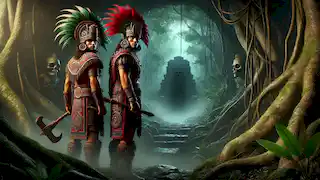
The Hero Twins and the Underworld Lords
The Final Ballgame
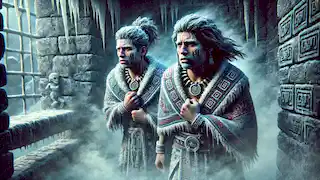
The Fourth Creation: People of Corn
The Legacy of the Popol Vuh
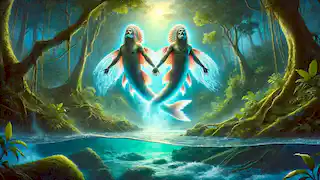
The Eternal Cycle
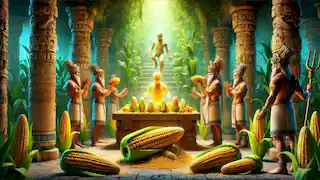
Enduring Through Time
The Legend of the Popol Vuh
Reading Time: 8 min
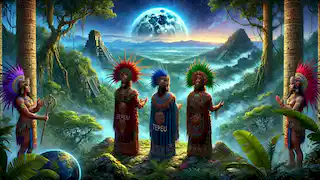
About Story: The Legend of the Popol Vuh is a Myth Stories from guatemala set in the Ancient Stories. This Dramatic Stories tale explores themes of Courage Stories and is suitable for All Ages Stories. It offers Cultural Stories insights. A timeless Mayan tale of creation, heroism, and the origins of humanity.

















